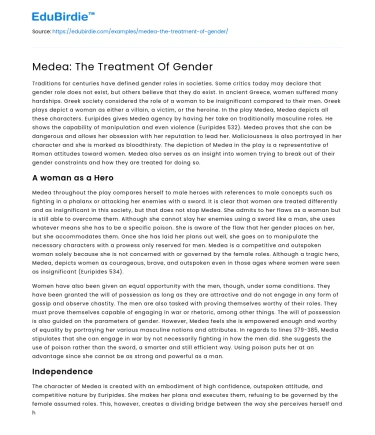Traditions for centuries have defined gender roles in societies. Some critics today may declare that gender role does not exist, but others believe that they do exist. In ancient Greece, women suffered many hardships. Greek society considered the role of a woman to be insignificant compared to their men. Greek plays depict a woman as either a villain, a victim, or the heroine. In the play Medea, Medea depicts all these characters. Euripides gives Medea agency by having her take on traditionally masculine roles. He shows the capability of manipulation and even violence (Euripides 532). Medea proves that she can be dangerous and allows her obsession with her reputation to lead her. Maliciousness is also portrayed in her character and she is marked as bloodthirsty. The depiction of Medea in the play is a representative of Roman attitudes toward women. Medea also serves as an insight into women trying to break out of their gender constraints and how they are treated for doing so.
A woman as a Hero
Medea throughout the play compares herself to male heroes with references to male concepts such as fighting in a phalanx or attacking her enemies with a sword. It is clear that women are treated differently and as insignificant in this society, but that does not stop Medea. She admits to her flaws as a woman but is still able to overcome them. Although she cannot slay her enemies using a sword like a man, she uses whatever means she has to be a specific poison. She is aware of the flaw that her gender places on her, but she accommodates them. Once she has laid her plans out well, she goes on to manipulate the necessary characters with a prowess only reserved for men. Medea is a competitive and outspoken woman solely because she is not concerned with or governed by the female roles. Although a tragic hero, Medea, depicts women as courageous, brave, and outspoken even in those ages where women were seen as insignificant (Euripides 534).
Save your time!
We can take care of your essay
- Proper editing and formatting
- Free revision, title page, and bibliography
- Flexible prices and money-back guarantee
Women have also been given an equal opportunity with the men, though, under some conditions. They have been granted the will of possession as long as they are attractive and do not engage in any form of gossip and observe chastity. The men are also tasked with proving themselves worthy of their roles. They must prove themselves capable of engaging in war or rhetoric, among other things. The will of possession is also guided on the parameters of gender. However, Medea feels she is empowered enough and worthy of equality by portraying her various masculine notions and attributes. In regards to lines 379-385, Media stipulates that she can engage in war by not necessarily fighting in how the men did. She suggests the use of poison rather than the sword, a smarter and still efficient way. Using poison puts her at an advantage since she cannot be as strong and powerful as a man.
Independence
The character of Medea is created with an embodiment of high confidence, outspoken attitude, and competitive nature by Euripides. She makes her plans and executes them, refusing to be governed by the female assumed roles. This, however, creates a dividing bridge between the way she perceives herself and how she is perceived by others. She believes that, by doing so, she displays the traits of those that have been described as tragic heroes before her in ancient history. However, this is met with some contradictions, especially being subjected to contemptuous treatment from Jason and Creon. In showing her vigor in independence, Medea refuses to conform to society's norms and upholds the masculine ideals, creating a conflict with the Roman culture (Euripides 536). Her practice in witchcraft and the infanticide were against any society’s way of living, especially for the women. The decision to follow this unfamiliar path of the way of life shows how independent she was.
Lack of Control for Women
As mentioned earlier, Medea is characterized as being overconfident and outspoken, but she is greatly disobedient. This is because of a lack of male guardianship in her life (euripides536). In ancient Roman society, every woman was subjected to a form of Male guardianship in the form of a father or husband. This was a way of controlling the women, thus prohibiting them from engaging in any form of 'fun' like alcohol consumption or even the public display of wealth. However, as seen in the play that Medea cuts every tie with any male counterpart. The union with Jason was based on mutual consent, proving that Medea chooses to be in control of her fate and not be dictated by any norms (Euripides 529).
Conclusion
Medea as a women representative in the play, despite all challenges conquers gender roles. She stands up for herself despite her hurting from the betrayal of the oath they had made with Jason. She stands up and paves way for women not to be limited by the rules that are put there by society to prevent them from standing up for themselves.






 Stuck on your essay?
Stuck on your essay?

